- Home
- M G Vassanji
The Book of Secrets Page 2
The Book of Secrets Read online
Page 2
I remember my moment of decision exactly — this book, this burden before me. It had, as I sat contemplating it, the aspect of a portal. Should I enter, give to it my retired days? … I wrote a letter, to a very dear former student from whom I had received a postcard a few months before, and proceeded to meet a librarian and coax him to open a certain locked cupboard at the Dar es Salaam Library. I entered headlong into an engagement with the book.
I would — I told myself — recreate the world of that book. I would breathe life into the many spirits captured in its pages so long ago and tell their stories; and I would revive the spirit of the book itself, tell its own story. And so I would construct a history, a living tapestry to join the past to the present, to defy the blistering shimmering dusty bustle of city life outside which makes transients of us all.
In the weeks that followed I discovered the dark, passionate secret of a simple man whose life became painfully and inextricably linked with that of an English colonial officer. I saw that the ephemeral tie between them — the tragic young woman Mariamu — would become the most tenacious bond of all. I saw an old uncertain world give birth to a new, no less fragile one, and I followed the trail of this book, from the pen of a lonely man to the obsession of another, from ancient lives caught up in imperial enterprise and a world war to these, our times: and finally to myself, and the hidden longings of my past. At the end of it all, I too lie exposed to my own inquiry, also captive to the book.
PART ONE
I
The Administrator
We carry within us the wonders we seek without us;
There is all Africa and her prodigies in us.
— Sir Thomas Browne
And now, sir, I come to Africa …
— William Pitt
(in the House of Commons), 1791
1
“We seem to have sighted Mombasa at last,” wrote Alfred Corbin in his diary on 1 March, 1913, aboard the German vessel Prinzregent. He concluded his brief entry with a reminder to himself to order more pipe tobacco the next time he wrote home. After that he strolled out on deck. Passengers had crowded on the starboard side to gather in the new vista which presented itself to eyes long weary of the sea and the ghostly distant shapes of land.
How fitting, he thought then of this sight of Africa, that it should greet you so gently; how melodramatic and unaffecting if it were to show you straight away its power and wildness, its strong colours, the pulling force. It was in order to be impressed, to confirm his schoolboy expectations fed on tales of famous adventurers and explorers, that he had strained his eyes seaward ever since they’d left Marseilles with a fresh load of passengers from the British Isles. He himself had boarded the Prinzregent at Hamburg. It was the sixteenth day at sea, the ship had turned southwestwards to round the island town and bring into view the town’s full glory in the sun. A sight that even then he knew he would never forget. The coast of Africa, the harbour of Mombasa. Its modesty, the composed exoticism of its orientalness, stayed with you like the strong lines of a deceptively simple masterwork. White houses shimmered on a hill rendered lush green with vegetation. A fringe of palm trees decorated the shoreline, a white road came up to the beach where a restless waving crowd awaited. The waters were dark blue but choppy, the sky spotless that day. Even before they entered the southern harbour, dhows and bagalas hailed them, smaller craft hustled cheerfully alongside with expectations of business.
On the ship, his fellow passengers would have noticed a man of medium build and average height; he had fair hair and a thick moustache, droopy eyes. He would have been observed as being somewhat shy.
Alfred Corbin had spent his childhood days with governesses and in schools in Stockholm and Prague and Hamburg, speaking more of the languages of these foreign lands — at least in his youth — than he did his mother tongue. His father, Charles, after a stint at cattle farming in Argentina, had settled on a career in the Consular Service. The family had a house in Devon, and the only claim to distinction it could make was through relation to Sir George Corbin-Brown of the Punjab, and through a vague connection on his mother’s Scottish side to William Pitt’s war minister, Dundas. Of his two brothers, Robert was an officer in the Indian army and Kenneth was an Area Commissioner in Nyasaland. To start off his youngest son in a different direction, Charles Corbin found for Alfred a post at the Hamburg agents of the Union Mail Shipping Lines. This job was not without interest for Alfred — it was in Hamburg harbour that he first laid eyes upon natives of Africa, ship hands conscripted from the west coast of the continent — but Alfred was soon eyeing other opportunities. A chance came when he was returning from London to Hamburg via Paris.
Years later, in his published memoirs, he would describe how he was conscripted into the Colonial Service. In Paris he’d been told the undersecretary for the colonies, Mr. Winston Churchill, was resting in a local hotel, having returned from a trip to East Africa. On an impulse he went and presented his card at the hotel, noting his relation to Sir George. “If he is related to Kenneth Corbin, send him up,” came the reply. Mr. Churchill, it seemed, had met his brother in British East Africa (as Kenya was then called). In a room strewn with paper and filled with cigarette smoke, the undersecretary, in the midst of a late breakfast, accepted Alfred Corbin’s application for a job, which would require from him, as he put it, “his whole life and soul.”
Even though it would be a few years later that he took up the offer (having become involved with a woman in the meantime), Alfred Corbin would always consider it propitious to have been initiated into the Colonial Service with these credentials, whose value would grow with the years. And he never left the Service until he retired.
2 March, 1913
We were taken into dugout boats, called “ngalawas,” and were rowed to the shore by boisterous boatmen who sang in clear voices to each other. As soon as we stepped on solid ground we were completely taken over by a surge of porters wearing that white Swahili cotton smock so popular here and called “kanzu.” Cranstone the surveyor, who had been chattering so tiresomely since Port Said about Mombasa, the eye in a socket, the leafy hiding place where Sinbad must surely have wandered through and perhaps seen the roc’s egg, began muttering now about the den of forty thieves, saying “apana-apana, enda-enda” and more. Two Indian policemen in enormous beards and red turbans watched the scene calmly; a group of scantily dressed Indian men searched nervously among their arriving compatriots whom we had picked up in Aden. Many of the Europeans on the boat were met or knew their way about. It was unbearably hot and noisy, the clamour contagious and unsettling. As I looked around me uncertainly, the focus of a cacophony of solicitations, an Indian man pushed through the throng and introduced himself with a restrained smile.
“Sir, please allow me,” he said in a soft voice.
Gratefully I relinquished my holdall to this short dark man who was wrapped in a black tunic with a shawl around his neck. He said his name was Thomas and would I follow him. He had a rather musical voice and the curious habit of moving his head from side to side as he spoke. He turned around and I followed, keeping my eye fixed on the back of his glistening black head. It took me the rest of the day to realize that the man was perhaps attempting to muffle his cold with the silly-looking woolly shawl, for there was a faint whiff of camphor in the air …
Thomas led him to a corrugated-iron shed, a blazing furnace of a place. This was the Customs House, where a long line of Europeans and a few American hunters awaited inspection. An Indian clerk sat at a table, filling out forms in quadruplicate, periodically releasing an angry or fuming passenger with a hoarse “Next!” and a stamp on a passport. He saw and acknowledged Thomas. Beads of sweat fell visibly from his brow onto the papers he wrote on. From time to time he would move an index finger across his forehead and sweep a rain of sweat onto the earthen floor.
“You have a gun, sir?” asked Thomas.
“A rifle …”
“Not to worry.”
Thomas
looked away with the air of someone ready to wait indefinitely, and Corbin looked outside through the barred window at the sunny courtyard, ready to do the same but with less composure.
“Please point out your baggage, sir,” said Thomas suddenly.
Corbin did so. Then by some unseen magic all his belongings appeared at the head of the queue and he was summoned with a deference the other Europeans could not challenge. His gun and ammunition registered, he was whisked with style out of Customs and his baggage loaded by a porter onto a cart bound for the Mombasa Club up the road.
Only then did it occur to Corbin to enquire about the man into whose hands he had put himself, now walking solidly beside him. “Don’t worry, sir,” said the man, but the special treatment at Customs had cost five rupees.
They walked through the exclusive English settlement called The Point, strewn without regard for economy or geometry with picturesque villas in lush gardens connected to each other by roads barely better than tracks. The sun-hat was heavy on his head; without it, he understood, he would collapse. The temperature was ninety, he felt clammy, and the slight breeze from the ocean lacked the spirit to revive. Not too soon, it seemed, the large white building of the Club appeared in sight. With a relief that overwhelmed him, Corbin almost ran into its spacious shade.
The manager, Hanning, greeted him with a lemonade. He was a big red-faced man with thin yellow hair and a handlebar moustache, and wearing a rather sparkling white shirt and tie for the time of day. He’d had a swim and a bath, it appeared. Thomas left, promising to return. Corbin took a small table inside the bar, next to the doorway, through which he could look out at the verandah and the garden. There were two other entrances to the bar, one leading from the dining room where lunch was being served by black waiters in kanzus and red fezzes. There were African hunting and war trophies on the walls; a niche held an Arab copper-work jar under a pair of daggers. Behind the bar, at which stood a barman looking busy, were three group photographs of men with hunting or fishing spoils. A corridor past the snooker room led to a small number of guest rooms, to one of which Corbin was presently shown. The window faced the back, and he could see part of the road leading down to the old town.
3 March
The room is large and airy. It has two beds, two chairs, a chest of drawers and a mirror, otherwise it is absolutely bare. There is no carpet. Several passengers on board ship called this club the best in Africa! …
4 March
“Venice has its gondola, London its cab, and Mombasa has its gharry, as I always say,” says Hanning. He is a drifter, who answered the Club’s notice, which was placed in the Cape Town Times, and came over to see the place, he says. The gharry is a tram running on rails and pulled by one or two natives. It is the only way to travel on the island, I am told. The PC is away and I might as well enjoy the metropolis while I can, before I get posted somewhere where I’ll be lucky to have a roof over my head. He has given me a list of the sites to visit. The Club has a small guide book, which he has lent me to browse through. The old Portuguese fort is a must. The old name of Mombasa was Mvita, for war.… Then the ancient mosque, the northern harbour where the dhows anchor, the water gate. And, no visitor to Mombasa misses the boat ride around the island …
The Club verandah looked upon a dense garden of brilliant colours running all the way to the cliff edge, which was demarcated by a wire fence and white stones. Beyond lay the ocean, its shimmering, misty horizon a fitting sight for an expatriate or tourist or colonial servant to contemplate over a cocktail.
He began his sightseeing the same day. A tram had been called, and it emerged now from under the shade of a bougainvillaea bush. It was rolled noisily to the rail and lifted upon it, after which he sat on the wooden seat under its canopy and was pushed and free-wheeled all the way down the tree-lined shady Kilindini Road.
If The Point presented meditative vistas — dreamy groves, brightly coloured gardens, vast ocean, coral cliffs — Mombasa town assailed all the senses at once. The smells of overripe pineapples and mangoes, the open drains, animal droppings; costumes of a dozen cultures and the babble of as many languages.
He played tennis every evening at the Sports Club while he waited for the Provincial Commissioner, the PC. At the new and already potholed cricket pitch he watched a friendly game on the first Sunday he was there: Indians versus the English, one tribe on either side of the pitch. It was a clear rout of the ragged Indians, most of whom had never held a bat before and had merely been assembled for the Englishmen’s pleasure. Dinner parties at the Club degenerated into drunken orgies, after which members had to be assisted into their trams. On the second Sunday of his stay, he participated first in an oyster picnic on the shore, followed by a “cocktail parade,” in which the object was to mix enough drinks to knock oneself out.
There was one lion trophy on the wall beside the bar. A fierce, huge head, its mouth stretched wide open, the contemplation of which could make your stomach turn, your hair rise. As you turned away uneasily from this meeting you might be told by the barman that this lion had carried off twenty-seven victims in Tsavo: a coolie from an open railway carriage; an unknowing porter from a campfire away over a four-foot fence before his companions discovered him missing, the following day finding his bloodied clothes, some bones, and a severed head; a sleeping labourer dragged out from between two oblivious companions inside a tent … and so the bloody toll went. If it was late in the afternoon, your attention would invariably drift, from that vanquished terror on the wall to the oversized human head below it, belonging to its hunter, Frank Maynard, who was sitting at a small table holding a whisky. There were stories about him, too, but they were told in his absence.
He was a big man in army khaki, who came every day for his sundowner. From where he sat he quietly watched all the goings-on in the room — the bluster and chit-chat, the deals and complaints, the dart and card games, of the merchants, the officials, and the engineers. His presence, once he arrived, like the man-eater’s above him, became part of the character of the room. The hair on his large head was brown and sparse, he wore a small moustache, and the cold green eyes revoked any trace of warmth betrayed by the faint toothy smile at his lips. Nevertheless, he was liked and much respected for what he was, the more so for the predicament in which he had (unfairly, it was said) been put.
Frank Maynard was a captain in the King’s African Rifles who would pursue a recalcitrant animal or tribesman with like ferocity and ruthlessness. Currently he was on suspension pending an inquiry regarding his conduct on a punitive expedition against a tribe and was biding his time on the coast.
On several occasions Corbin’s eyes had met and acknowledged that searching look from the trophy wall. Then one day, after he had been deposited at the Club door by a tram after a sightseeing tour, as he sat in the bar wiping sweat from his brow and contemplating his second bath, despairing over yet another change of clothes, Alfred Corbin’s eyes fell briefly on the soldier. That momentary look seemed to spark a resolve, for Maynard got up, and with slow deliberate steps came straight towards his table.
“Frank Maynard,” he said, shaking hands and sitting down.
“Corbin, Alfred Corbin.”
“So I’ve heard, old chap.”
Corbin tried not to feel like a mouse under that overbearing smile, that brilliant predatory gaze, not to become too conscious of the heads turned to stare at them from the bar. He was waiting for his first posting in Africa, and this was a man who had trampled the land from corner to corner, slept in the forests and killed its wildlife and natives.
“I knew your brother in India. Robert. Good man.”
“In the Punjab?”
Maynard nodded. The same amused look.
“And I met Kenneth in Voi. Didn’t get to know him well, though, he was on his way out — home leave, it was, and Nyasaland after that, I believe.”
They had a drink together. The lion on the wall, Maynard told him, catching his gaze, had measured nine-foot-e
leven, tip to tip, nose to tail; it took eight men to carry it.
The following evening Corbin was invited for supper.
Maynard kept rooms on the second storey of an Arab house on the Kilindini Road, not far from the Club. He greeted Corbin at the door in a yellow kanzu and a tasselled red fez. The reception room was furnished simply in the Arab style and they sat on pillows. Maynard produced a hookah and Corbin a cheroot. By this time the younger man was more composed, the other relaxed and less intimidating. A woman suddenly entered the room with a sharp rustle of clothing which made Corbin start. She was strikingly beautiful, a half-caste of partly Arab or Indian blood, partly African. The short length of buibui, worn around her shoulders over a colourful dress, was what had rustled; she hovered around them for a while before finally taking a stool some distance away.
“Stop gaping, man!”
Corbin raised an eyebrow. Maynard chuckled.
“A few years ago practically every man in Nairobi kept a native girl — or two or three. Now they are more civilized and busy with each other’s wives.”
The night was cool, a light breeze blew in through the open window; there was a mosque not far off, from which the muezzin’s “Allahu Akber” presently came through clearly. Below, from the courtyard of the building came the sounds of boys playing, men chatting on stone benches by the little garden, probably over their coffee. Over whiskies Corbin and Maynard talked of their schools, their families. Maynard’s was a banking family; his refusal to join his father caused him much guilt and brooding. He was now estranged from his family.
The woman got up and left the room again with the distinct rustle of her buibui. She returned with a pitcher of water for washing hands. Then she brought their food: meat curry, and rice and bread. They drank more whisky and had plum pudding from home for dessert.

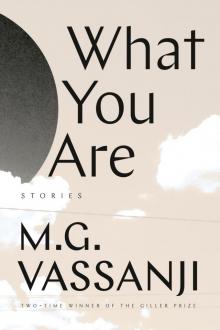 What You Are
What You Are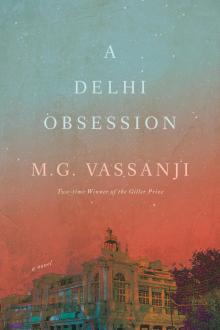 A Delhi Obsession
A Delhi Obsession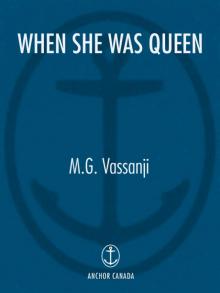 When She Was Queen
When She Was Queen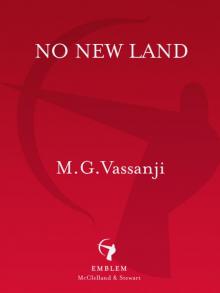 No New Land
No New Land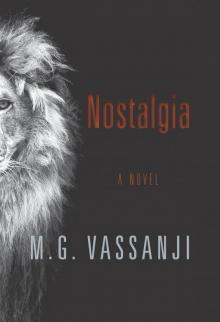 Nostalgia
Nostalgia Mordecai Richler
Mordecai Richler The Book of Secrets
The Book of Secrets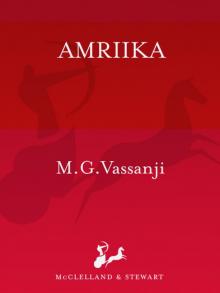 Amriika
Amriika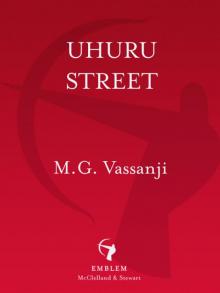 Uhuru Street
Uhuru Street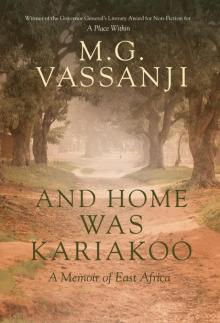 And Home Was Kariakoo
And Home Was Kariakoo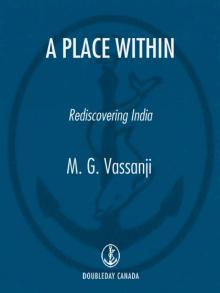 A Place Within
A Place Within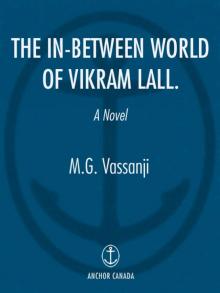 The In-Between World of Vikram Lall
The In-Between World of Vikram Lall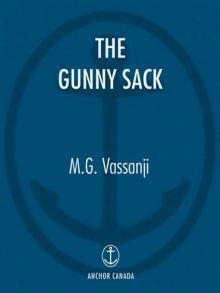 The Gunny Sack
The Gunny Sack